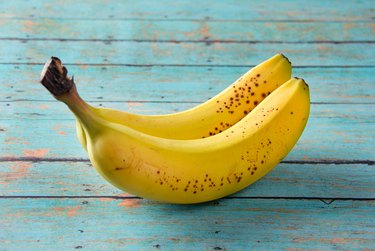
Bradycardia is a heartbeat that is slower than normal. A pulse less than 60 beats a minute is generally considered cause for concern, although some young people and trained athletes may have a slow pulse because they are physically fit. There are a number of reasons for bradycardia, such as heart disease, aging or problems with the electrical system in the heart, but in some cases, the reason may not be clear. Your diet may play a role in bradycardia. Consult a doctor or dietitian to determine the best diet for your condition.
A Healthy Diet
Video of the Day
It's important to eat a healthy diet if you have bradycardia. For good heart health, your diet should be low in fats and contain plenty of fruits, vegetables and whole grains. You should eat enough calories to maintain your normal weight; being overweight can increase your risk of heart disease. You should drink alcohol moderately if you have bradycardia, as heavy alcohol use can make the condition worse.
Video of the Day
Total Calories
Although weight loss may be recommended if you are overweight and have bradycardia, it's important not to let your total calorie intake get too low. An article in the September 1995 issue of "Presse Médical" reported that adolescents in a weight loss program developed bradycardia. The adolescents were eating fewer than 1,350 calories a day. The researchers noted that very low calorie diets are known to cause bradycardia. Lean meats, dairy products, eggs and poultry are good protein choices. Olive oil provides a good source of mono-saturated fats, while fruits and vegetables supply carbohydrates, vitamins and minerals.
Electrolytes
Electrolytes are minerals such as sodium, potassium and magnesium that can carry an electrical charge. They are necessary for proper heart activity. Deficiencies or an excess of sodium and potassium can cause heart arrhythmias – changes in the pattern or speed of heartbeats. If you have low blood sodium, your doctor may restrict your fluid intake. If your blood potassium levels are high, avoid foods that are high in potassium, such as bananas, squash and lima beans.
Whole Grains
Whole grains are another group of foods that can improve the health of your heart. Whole grains can reduce your risk of heart disease, decrease your cholesterol and help you lose abdominal fat, according to Johns Hopkins Medicine. Whole grains contain vitamins, minerals and antioxidants, as well as the bran, which is rich in fiber. Soluble fiber lowers cholesterol and insoluble fiber makes you feel full, so you tend to eat less. Whole grains also include the minerals sodium and potassium, which are important for a person with bradycardia. Choose whole-grain oats, wheat, brown rice, bulgur or buckwheat.